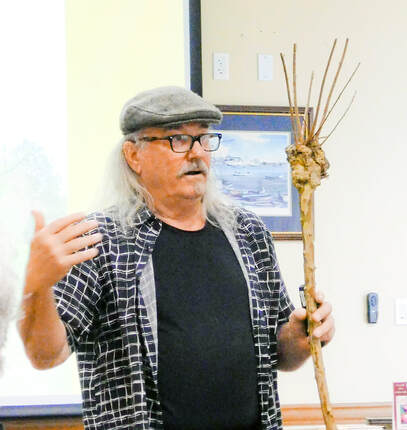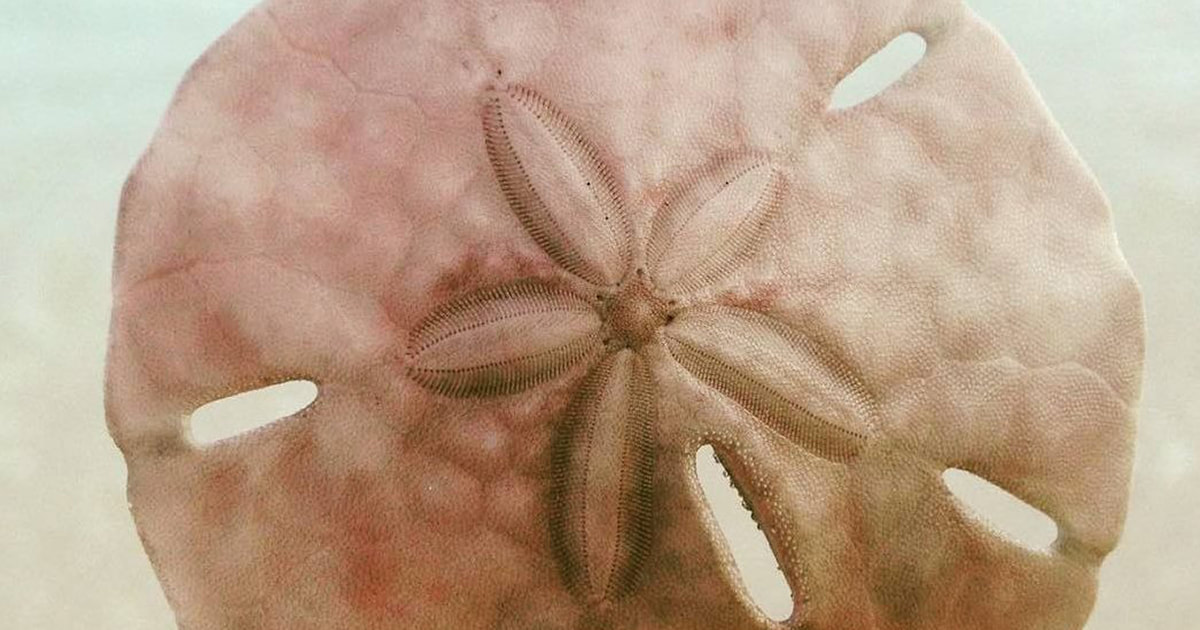One of the country's most engaging gardeners is also the best public speakers that writer Rheta Grimsley Johnson has ever heard. Here's her take on a personal hero.
- story by Rheta Grimsley Johnson, photos by Rheta Grimsley Johnson and courtesy Felder Rushing website.
 Felder at the Bay St. Louis Library, photo by Rheta Grimsley Johnson Felder at the Bay St. Louis Library, photo by Rheta Grimsley Johnson
Felder bills himself “The Gestalt Gardener” on public radio, and single-handedly takes the intimidation factor out of gardening. He merrily laughs at the manure spread by garden clubs, garden masters and extension services.
“Refreshing” doesn’t cover it. I once was assigned by the Atlanta newspaper to write about a venerable women’s club in Danville, Va. After the meeting, two members invited me to join them at a country club dinner. At some point the ladies noticed an acquaintance coming into the gilded dining room and immediately started whispering behind their hands to one another. They shared the dirt: She’s the kind of womanwho plants zinnias in the front yard! Let’s just say that zinnias in the front yard would be fine with Felder. He plants whatever he likes wherever he likes. He sometimes uses plastic buckets and old enamel dish pans for his containers. When someone asked him if he cared what his neighbors thought he said, “I do care, but it just doesn’t matter.”
He plants things that years of experience have taught him will do well in the South. No Oriental garden for Felder. No British country look – unless he’s at his second home in England.
And he plants things that “when I’m tired of looking at it, I’ll eat it.” Like the day lily bulbs he sautes. He plants tomatos every year though he says he can’t grow them. “They give me hope.” And he plants things that don’t need much weeding, “…because I’m old and when I bend down I see sparkly things.” He loves bottle trees and has the concrete chicken his grandfather gave his grandmother as yard art rather than some fancy and expensive long-legged lawn bird. In other words, Felder practices what he preaches. I’ve only seen his yard in the slides he shows at his talks, but I have it firmly planted in my imagination. It gives me license.
Years ago, when he moved into his suburban Jackson, Miss., home it was all St. Augustine grass, a steep slope and “a lawn mower on a rope.” You should see it now.
No contortionist pruning of shrubs for Felder, a look he describes as “gum drops and meatballs.” His approach is laid back and heavy on the whimsy. When he’s asked about whether he puts weeds in his mulch pile, he answers in the affirmative. Why not, he reasons. After all, there are weeds in his beds. “I put a dead raccoon in my mulch pile. I sifted out the bones and teeth.” While describing the “proper” way to prune a rose, he knows the textbook answer but also adds “you can prune a rose with a cherry bomb.” Because he spends the hottest months in England – conveniently bookmarked by his favorite London flower shows – Felder rents out his main house to medical students and lives in a shed in the yard. His kitchen is eight feet by eight feet. “You can open the oven or open the drawer.” And the last wonderful thing about Felder, the hero I haven’t quite worked up the courage to say hello to. He knows his lore from “The Andy Griffith Show.” Azaleas, he says, are like the show’s “Fun Girls from Mount Pilot.” They blow into town and cause a stir, but just as quickly they are gone and things get back to normal. That quip alone is reason enough to adore Felder from afar.
Read more about award-winning author Rheta Grimsley Johnson on her website - you'll also be able to order her books!
Southern author Rheta Grimsley Johnson unpacks sentimental sand dollars to decorate the Christmas tree in her out-of-step Pass Christian chalet.
I love my house. Woefully out of step with prevailing style, it suits me. It also reminds me of a small wedding chapel at Georgia’s Callaway Gardens, where once, early on a December morning, I made vows I would not keep.
My house looks its best at Christmas. With a live tree in one of the big glass windows that fill the front, it is if the outside has slipped inside, blurring the lines between exterior and interior convincingly. Only unraked hickory leaves banked against glass reveal the demarcation. The Christmas tree is up, no credit due me. Two nice young men from an Ocean Springs nursery set all eight flocked feet of it in its ready-made stand in the proper spot. They left. And now the tree looms unlit and bare and dares me to decorate. So far I’ve avoided it. Somewhere in a laundry room that also serves as my office and domestic catch-all is a box of sand dollars I often use as ornaments. I picked them up on a St. Simons Island beach 43 years ago – Georgia, again -- bleached them white and strung ribbon through the holes nature gave them. Whenever they are touched, ancient sand still falls out.
I remember the day I found them. You could feel the sand dollars with your bare feet on the ocean floor before you could see them.
I realize that means the sea urchins were not dead when I harvested. The dollars that were dead or dying – “moribund” Wikipedia calls them – would have been on the beach being naturally bleached by the sun. My catches still had their velvety silica and were moving in concert and about their business, possibly even cloning, when my toes touched them. Maybe that’s why they make such ideal Christmas ornaments. They come packaged with their own guilt, which powders the floor as I hang them. And I will get around to hanging them. I always do. Else those urchins in the order Clypeasteroida would have died in vain. Only a couple of times have I gone another decorating route. One recent year the tree was artificial and pre-lit, a gorgeous specimen I “won” at the Hancock Library tree gala, homage to those innocents killed in Paris by terrorists, and decorated with French flags and Eiffel Towers. Something must jumpstart me into the season, reminding me to get through it. Probably it will be music. Usually is. The “Blood Oranges in the Snow” album Carole McKellar gave me one year is good for a nudge. That’s by musicians called Over the Rhine, a husband and wife duo that do the best cover of “If We Make it Through December” I’ve ever heard. And there’s the holiday blues collection my New Orleans buddy John Bedford gave me as a gift one year. Till you’ve heard Charles Brown’s “Please Come Home for Christmas” three or four times nothing gets done. You can run from the holidays, of course, but you cannot hide. For one thing, it’s hard to avoid the sight of an eight-foot tree covered in artificial snow in a small living room two blocks from the beach. Emotional blinders only hide so much. By the time you read this I’ll have found the box, hung the sea dollars, played the albums, had a good cry and gone on about my holiday business. If I remember to water it, this monster tree might even serve for Mardi Gras. Or not. I’m usually first to the curb with leftovers. The melancholy is as much a part of the season as tinsel and wassail. It passes. And soon enough, the tree can be on the beach, fueling a bonfire, toasting the very toes that tentatively outlined the urchins that, with any luck, will go back in a shoebox and make the clutter cut for another 43 years.
One of the country's favorite female syndicated columnists considers the rhythms of her recent retirement.
- story by Rheta Grimsley Johnson, photography by Marc Lamkin
Days would go by without people stopping by to look at the beautiful assortment of paintings, pottery and photography. I felt tempted to write “Art Doesn’t Bite” on the sign outside but somehow refrained.
Marc seems to be sincerely feeling my pain about the closing. Few do. I mailed back his unsold photographs that combine humor, pathos and beauty in the strangest, most delightful way. I felt like a fool. How had I failed to sell those?
And he wrote back that both of us are goal-driven, needing a project, something to work toward. “We don’t golf, sew, hunt or hike,” he said. So, he reasoned, we feel rudderless in retirement.
An architectural photographer by trade, Marc still shoots a couple of “official” jobs each year, but mostly now sits on his deck and lets the subject matter come to him. He shares a lot of pictures of sunsets, flowers, grandbabies and rainbows. They are beautiful. I find them infinitely more interesting than 99 percent of the art photos I’ve seen in coffee table books and museums. And yet Marc admits to missing real deadlines and relentless struggle to get a job done just right. But probably not enough to leave his comfortable perch and his big loving family and take to the road again.
Therein lies the retirement conundrum. We miss the work but not enough to do anything about it. I loved the road for a long time but had rather take a beating now than drive more than 20 miles -- unless the road is in France.
I used to think nothing of writing four columns a week. Now I struggle to write one essay every other month. My idea with the gallery was to exploit the artists and other creative folk I’d met in four decades of trolling for columns. I would have art receptions, book-signings, music events and cartoon exhibitions. I would do all of this in a town of 3,000 that has six auto part stores, 12 beauty salons, 22 churches and not much else. The work would be different, more social than sitting at a computer by myself for hours each day while attempting to turn a phrase. I was good at my job, but I was tired of it, too.
If anything, the gallery proved lonelier. But I still can’t admit it was a stupid idea. There was, I believe, potential. Good ideas don’t always net good results. If you build it, they don’t necessarily come.
The things I worried about seem silly now. I worried about having enough inventory, and now struggle to return much of it. I worried I didn’t know enough about art to start a gallery. Turns out, I knew far too little about business to start a gallery. Right out of college I tried to birth a weekly newspaper. After 26 weeks, the adventure was over. I swore to myself then that I’d never be in business for myself again. Until two years ago, I remembered the lesson. Marc says I get points for trying. He charitably called me a “risk-taker,” which is a nice way of saying I threw a lot of money at a vision nobody could see but me.
Retirement makes some of us hobbyists, travelers or philosophical. Others of us still search for our retirement rhythm.
We remember our old jobs – the hard work and daily deadlines, bad food, bad roads and lonely nights -- the way Marc remembers the dreaded humidity. At the core of our beings. And, still, we miss it.
Rheta Grimsley Johnson was one of the longest-running female columnists in the country and beloved throughout the South. Her website contains a selection of past columns and more about her books.
|
Categories
All
Archives
July 2024
|
Shoofly Magazine Partners
Our Shoofly Partners are local businesses and organizations who share our mission to enrich community life in Bay St. Louis, Waveland, Diamondhead and Pass Christian. These are limited in number to maximize visibility. Email us now to become a Shoofly Partner!













































 RSS Feed
RSS Feed























